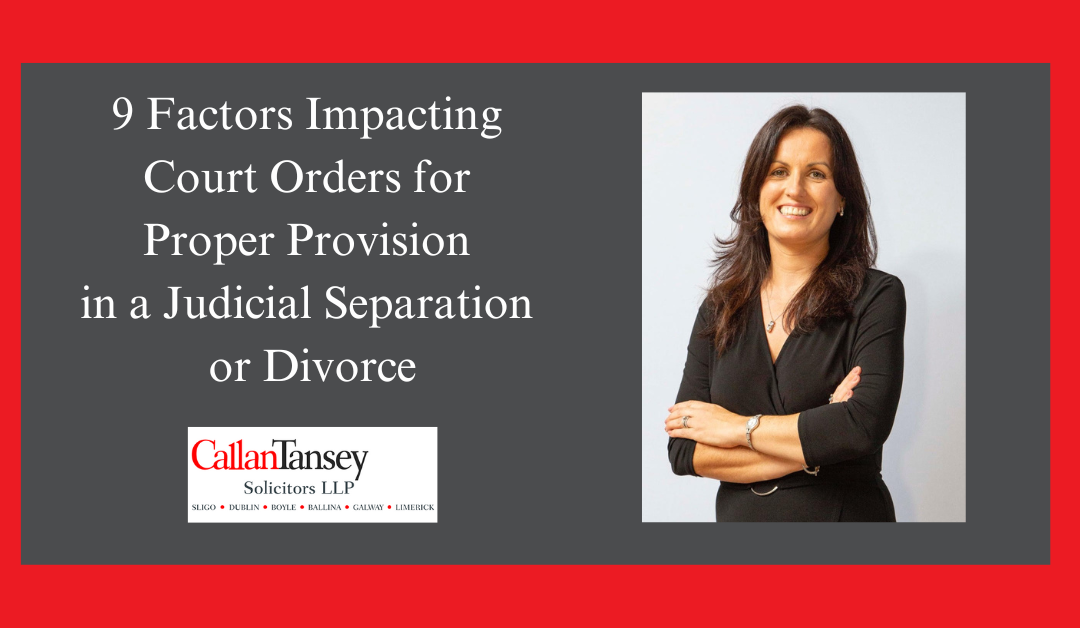There is a statutory and constitutional obligation on the court to ensure proper provision is made for the parties of a Divorce. Proper provision is not defined in the family law Acts and it is a matter for the court to decide, on the merits of each case, as to what constitutes proper provision.
Legislation sets out a number of factors to be taken into account when the court is determining ancillary reliefs. Case law has established that the best practice for a trial Judge in dealing with a Divorce case is to consider all of the circumstances of the case regardless of the size of the assets under the factors specified in the Legislation. Here Orlagh Sharkey, Partner and Head of Family Law, outlines those factors.
1. The financial resources available to each party concerned including any income/earning capacity and property.
Before any property is taken into account it must be established that the property is in fact owned by that party or that the person is legally entitled to it.
2. The financial responsibilities, obligations and needs of each party
The financial needs considered by the court are the reasonable needs of each party. This differs from case to case and the court will look to any special circumstances such as ill health or children who remain dependent in the marriage. The court will endeavour to provide for such needs by making periodic payment orders which are lump sum payments at certain times in the future.
3. The court will take into account the standard of living enjoyed by the family before the parties separated.
It is generally recognised that the standard of living of the parties following a Divorce/Separation will reduce. Through out a marriage both parties pool their resources and divide the costs and household expenses,whereas on separation there are two households to be funded with two sets of costs yet the income of those houses remain static. The court will endeavour to maintain the same standard of living enjoyed by the parties during the marriage post divorce however the reality is that this is not always possible as the assets may not allow for this.
4. Physical or Mental Disability of one or other spouse
If one or other spouse has a physical or mental disability this is a factor which the court will consider in making orders and the court is likely to make greater financial provision for the disabled spouse
5. Contributions by both parties
The court will consider the contributions made by each party throughout the relationship this includes contributions in respect of income,property,financial resources and contributions made by either party in caring for the dependent children. Caselaw has established that the role of both spouses whether financial or otherwise should be considered by the court and that a marriage is recognised as a partnership of equals therefore contributions made by a spouse which are not financial in their nature will be taken into account when the court is determining proper provision.
6. Duration of the marriage
The court will take into account the duration of the marriage.Generally the shorter the time that the parties have lived together the less likely it is that the court will make orders benefiting either spouse above their position prior to the marriage. Whereas the longer the duration of the marriage the more likely the court will make orders on the basis of a 50:50 division in respect of the marital assets.
7. Conduct of the parties
The court will consider the conduct of the spouses if the conduct is both ‘gross and obvious’. This is a considerably high threshold which has been set by case law. Generally conduct is not taken into account unless the court is of the opinion that in all the circumstances of the case it would be unjust to disregard the conduct. Generally extra martial affairs are not taken into account as they do not satisfy the threshold of ‘gross and obvious’.
8. Effect of roles assumed in the marriage on earning capacity
The court will consider if one party has assumed the role of homemaker in the marriage to the detriment of advancing their career and earning capacity. Such a sacrifice is recognised and factored into the making of ancillary reliefs.
9. Accommodation needs
The court will consider where each party will live on Divorce. Consideration will be given to whether the family home should be sold and how the proceeds of sale should be divided or alternatively one or other party may be in a position to “buy out” the other party.
As all family law cases are different and each case must be determined on its own facts the importance the court attaches to each of the above factors in deciding the case will vary depending on the circumstances of that case. There is no hierarchy in respect of the various factors but the overriding concern of the court is to ensure that proper provision is made for the parties of the case and any dependent children.
If you have any questions about the issues raised in this article you can contact Orlagh Sharkey by email at osharkey@callantansey.ie or by phone on 071 916 2032.


